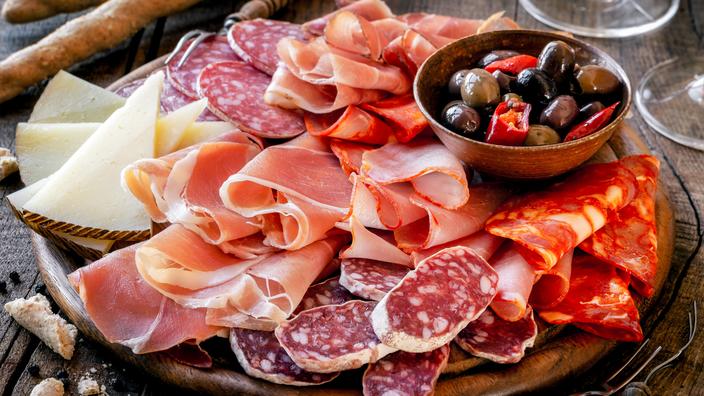MPs are starting to debate a text this week to gradually ban charcuterie makers from using nitrites, controversial preservatives that give cooked ham a pink color.
To discover
Dates, places, people concerned ... What changes this Monday with the vaccine pass
Prime Macron 2021: how does it work?
Read alsoCharcuterie: are nitrites bad for your health?
"
Protecting Citizens
"
The bill, which provides for a phased ban on these additives by 2025 “
must serve to protect citizens
”, affirms the MoDem deputy from Loiret Richard Ramos, who carries it. The text will be discussed on Wednesday in the Economic Affairs Committee, then in public session on February 3. His fate is uncertain. The government says it wants to "
wait for the return
" of the health agency Anses "
before deciding on the decisions to be implemented
", reports the Ministry of Agriculture to AFP. "
The risk/benefit analyzes must be established by the experts
", adds the ministry, which "
undertakes to follow the opinion
from ANSES.
This opinion, initially expected in 2021, is announced for the end of the first half of 2022. The agency, which refers to a "
complex referral
", "
categorically refutes any stalemate in the expertise in progress
", in a recent press release.
Richard Ramos judges this delay linked to "
pressure
".
On the front line for more than two years alongside the nutritional application Yuka, the consumer defense association Foodwatch and the League against cancer, Richard Ramos evokes a "
long parliamentary fight
" waged against "
very powerful lobbies
from the charcuterie industry.
Historically, pork butchers have used nitrated components to extend the shelf life of products and prevent the development of pathogenic bacteria that cause botulism in particular, a serious neurological condition that has been largely forgotten due to the health progress of modern agri-food.
In addition to giving the naturally gray ham its pink color, they also allow the use of lower quality, cheaper meat, while saving time in the drying process, according to a 2021 parliamentary report, co-signed by Richard Ramos.
Read alsoThe legal war of charcuterie companies against Yuka
In 2015, the International Agency for Research on Cancer (IARC) of the World Health Organization (WHO) classified processed meat, including deli meats, as carcinogenic (category 1).
It would promote, among other things, colorectal cancers.
Ingested nitrites are considered probable carcinogens (category 2A).
"
Any food consumed in excess can cause illness
", retorts Bernard Vallat, president of the Federation of charcuterie manufacturers (FICT).
Pleading to wait for the opinion of the health agency Anses before “
taking any legislative decision in the matter
”, he considers that the bill has “
no credibility
”.
An “ almost non-existent
”
risk
The defender of butchers highlights the threat of a resurgence of botulism. “
We cannot sweep away the microbiological risk, but health progress, quality control of raw materials and the cold chain suggest that the removal of nitrites will not cause botulism to explode. in France
,” Fabrice Pierre, research director at the Inrae research institute, specialist in the relationship between food and cancer, told AFP. This risk is today "
virtually non-existent
“, unlike that of developing colon cancer attributable to the consumption of cold meats, estimated at nearly 4,000 cases per year in France, underlines the toxicologist, who recalls that 63% of French people would exceed the recommended consumption levels ( no more than 150 grams per week).
“
We are told stories.
For them (industrialists), it's not a question of public health, it's a question of money, says Richard Ramos.
Hundreds of thousands of slices of nitrite-free ham are consumed every day, without any problem
”.
Read alsoAgri-food: Solexia completes its “
charcuterie
” division
Major manufacturers, such as Herta or Fleury Michon, have already launched ranges of nitrite-free ham.
“
The alternatives already on the market are often more expensive,
recognizes Karine Jacquemart, general manager of Foodwatch.
But competition would push manufacturers to realign prices downwards.
“
We want to win our case, as with titanium dioxide
,” underlines Benoît Martin, co-founder of Yuka.
This additive used mainly as a colorant has been banned from French plates since 2020 and must be banned across the EU later this year.







/cloudfront-eu-central-1.images.arcpublishing.com/prisa/6HFG2OUUPVBT5MA3DAKSYGQJ5Q.JPG)

